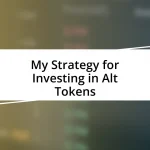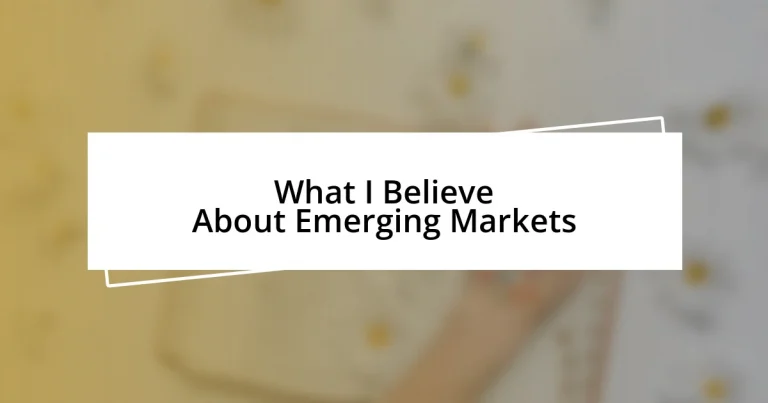Key takeaways:
- Emerging markets exhibit rapid growth and unique socio-economic dynamics, often driven by a youthful population and rapid technological adoption.
- Key trends such as rising middle class, digitalization, and sustainability focus are significantly shaping the development of these economies.
- While emerging markets present investment opportunities, they also face challenges like political instability and infrastructure gaps that require careful risk evaluation.
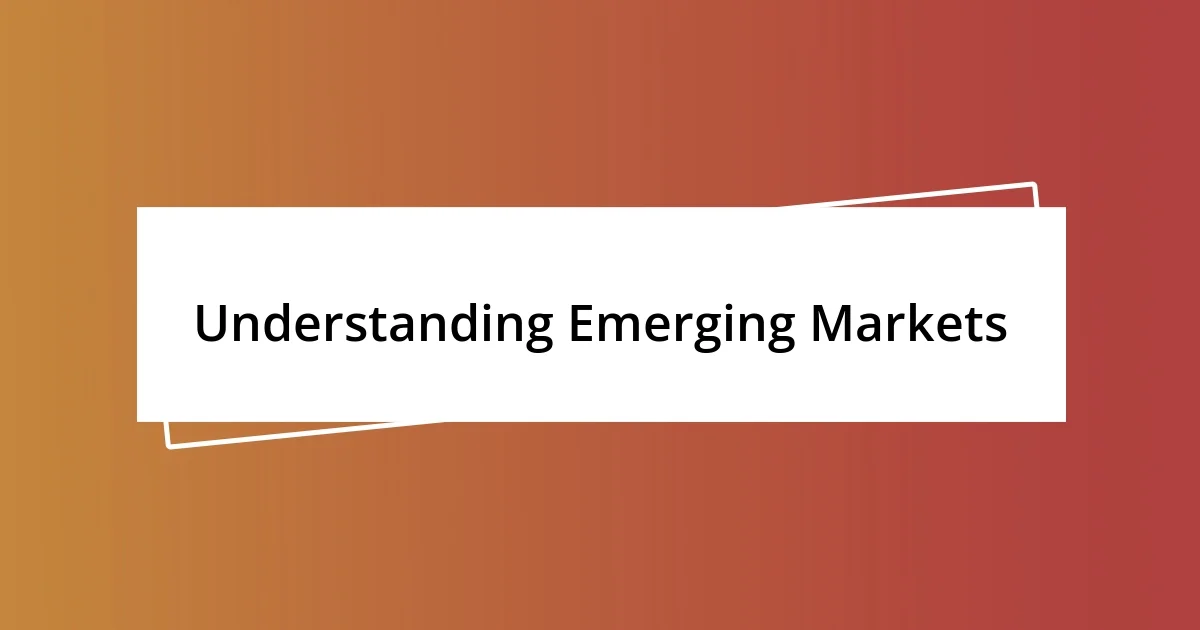
Understanding Emerging Markets
Emerging markets are essentially economies that are in the process of rapid growth and industrialization. I remember my first visit to an emerging market country; the energy in the streets was palpable, filled with hopeful entrepreneurs and bustling markets. It made me wonder, what drives this relentless pursuit of progress?
At their core, emerging markets tend to have unique socio-economic dynamics, characterized by a youthful population and increasing consumer demand. I find it fascinating how these markets often leapfrog traditional stages of growth, adopting technology in ways that surprise even seasoned investors. Have you ever considered how a smartphone in a small village can connect its residents to global markets overnight?
Investing in emerging markets can be a thrilling yet risky adventure, filled with potential rewards. I’ve seen friends dip their toes into these waters, only to be met with unexpected volatility. It raises the question: is the potential for high returns worth the uncertainty that comes with it? Each story from these markets is a testament to resilience and innovation, reminding us that behind the numbers are real people striving for a better future.
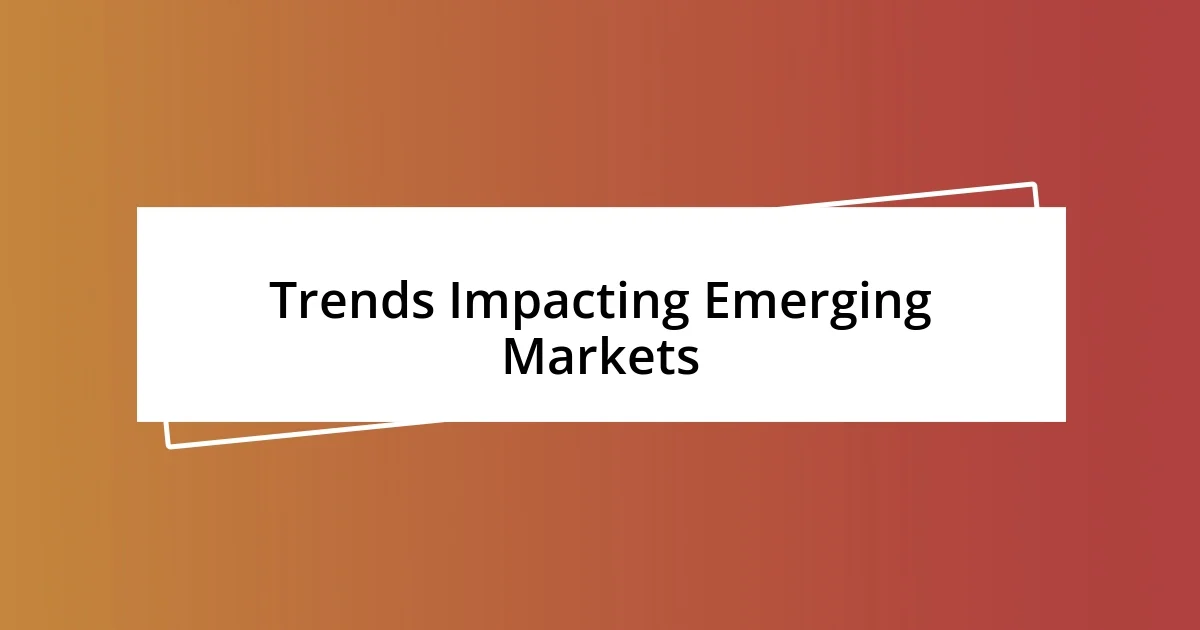
Trends Impacting Emerging Markets
The landscape of emerging markets is continually evolving, influenced by various trends that shape their trajectory. One trend that stands out to me is the increasing digitalization of these economies. I recall attending a conference where a young entrepreneur from Africa shared how mobile payment solutions transformed local businesses, enabling vendors to thrive without traditional banking. It’s heartening to see how digital tools can empower individuals and foster economic growth on a broad scale.
Here are some key trends impacting emerging markets:
- Rising Middle Class: An expanding middle class boosts consumption and demand for diverse goods and services.
- Technological Innovation: Rapid adoption of technology alters traditional business models, enhancing efficiency and accessibility.
- Urbanization: The migration to urban centers drives the need for improved infrastructure and services, presenting growth opportunities.
- Sustainability Focus: Increasing awareness of environmental issues prompts investments in renewable energy and sustainable practices.
- Global Trade Dynamics: Shifts in global trade policies create openings and challenges that emerging markets must navigate strategically.
I’ve seen firsthand how these trends lead to surprising developments. A friend who invested in a sustainable agriculture startup in Latin America was thrilled by the enthusiasm of local farmers embracing eco-friendly practices. Their willingness to adapt is a testament to the resilience of communities eager to leverage global changes for their benefit.
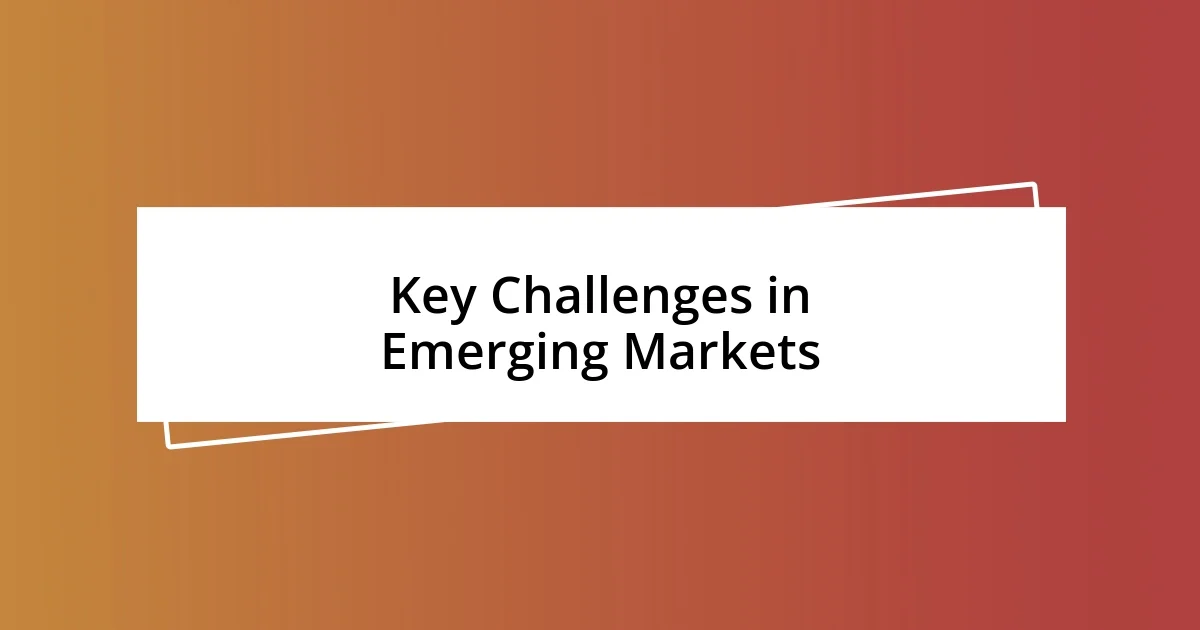
Key Challenges in Emerging Markets
Emerging markets face a myriad of challenges that can impede their growth. One significant challenge is political instability. I vividly recall a friend’s experience while working on a startup in a country plagued by abrupt government changes. He described the anxiety of uncertainty and how quickly optimism can turn into chaos. This unpredictability can dissuade foreign investment and hinder economic development.
Moreover, infrastructure gaps frequently stand as a colossal hurdle. During a trip to Southeast Asia, I was taken aback by the contrast between modern urban centers and underdeveloped rural areas. I remember visiting a town where basic roads were in disrepair, making it difficult for businesses to thrive. This disparity not only affects local economies but also limits access to crucial services like healthcare and education, fundamentally stalling growth.
Lastly, access to finance remains a pressing challenge for many emerging market entrepreneurs. I’ve witnessed aspiring business owners struggle to obtain loans, despite having promising ideas. A passionate woman I met sought funding for her artisan craft business but faced numerous hurdles. Her determination was inspiring; yet, it underscored the critical need for better financial systems to support the innovative spirit of these vibrant markets.
| Key Challenges | Description |
|---|---|
| Political Instability | Frequent changes in government can create uncertainty, deterring investment. |
| Infrastructure Gaps | Inadequate roads and services limit economic development and access to education. |
| Access to Finance | Entrepreneurs often struggle to secure funding, stifling innovation and growth. |
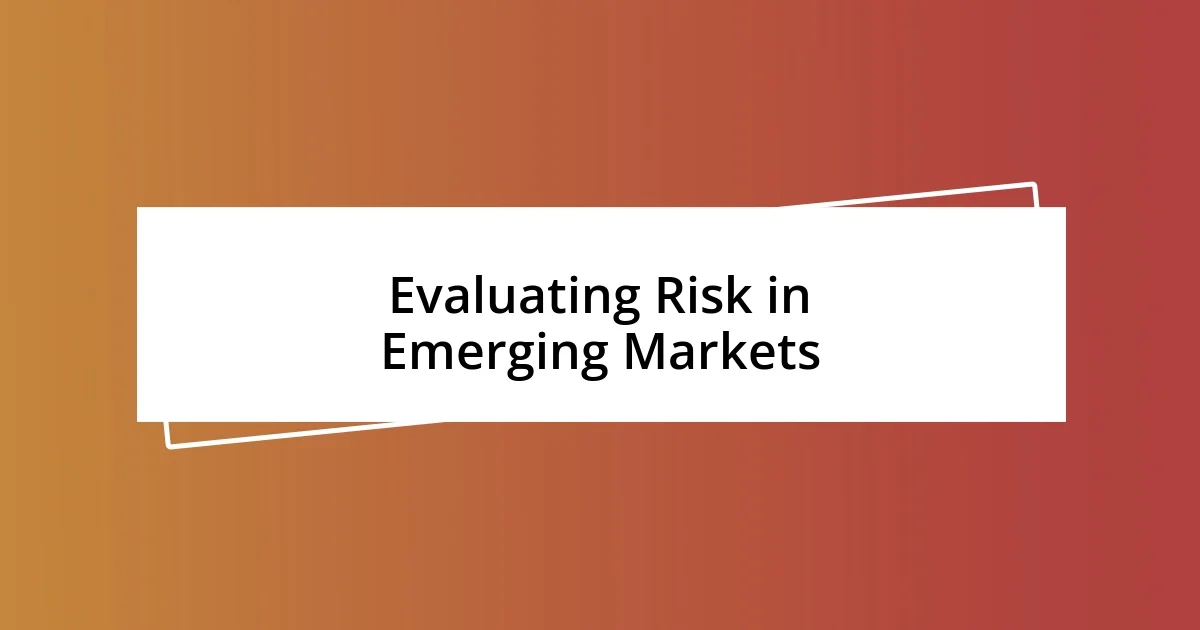
Evaluating Risk in Emerging Markets
Evaluating risk in emerging markets requires a nuanced understanding of the volatility that can impact investments. One time, while visiting a burgeoning tech hub in Latin America, I was struck by the palpable sense of optimism among startup founders. Yet, lurking beneath that enthusiasm was the constant worry about currency fluctuations and regulatory shifts. It made me wonder — how can one weigh the exciting opportunities against the inherent instability?
I’ve come to realize that assessing political landscapes is critical. During a business seminar in Eastern Europe, I listened to an investor share tales of navigating tricky waters due to sudden policy changes. His stories resonated with me, highlighting that even the most promising ventures can be derailed by unforeseen political turmoil. It’s a delicate balancing act: understanding the risk while not allowing it to overshadow potential rewards.
Moreover, assessing market maturity is vital in my experience. I once had a conversation with a local entrepreneur in Africa who had adapted his tech business to fit within an evolving framework of regulations. He spoke passionately about the challenges but also about the resilience required to innovate amidst uncertainty. This led me to ponder: is it the risk itself that intrigues us, or is it the chance to contribute to a landscape that thrives on transformation? The answer, I believe, lies in embracing both the uncertainties and the possibilities that emerging markets present.
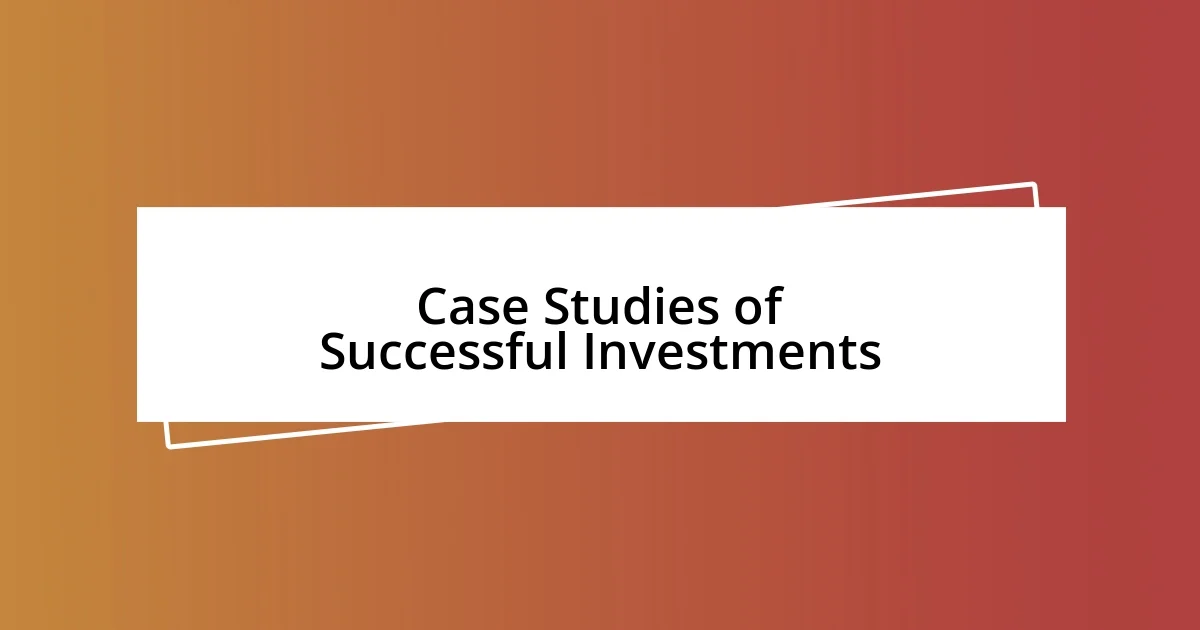
Case Studies of Successful Investments
One of the standout examples in the realm of successful investments in emerging markets is the rise of M-Pesa in Kenya. I remember chatting with an entrepreneur who leveraged M-Pesa to empower local communities by providing access to mobile banking services. It struck me how transformative a simple idea could be; what began as a mobile payment solution evolved into a vital financial tool that has uplifted an entire economy. I often think about the power of innovation—could we replicate this model in other regions?
Another inspiring case is the expansion of Unilever into Asian markets. During a conference, I learned how the company tailored its products to resonate with local cultures and needs. Their strategic investments in local supply chains not only boosted sales but also created jobs, which really impressed me. It made me wonder: isn’t the true measure of success not just the profits, but the impact on people’s lives?
Looking even further afield, I recall a fascinating discussion with a venture capitalist focusing on renewable energy projects in South America. He shared stories of investing in wind farms that not only provided sustainable energy but also actively involved local communities in project management. It made me reflect on how responsible investing can blend profitability with social responsibility—perhaps this is the direction future investors should consider if they genuinely want to make a difference.
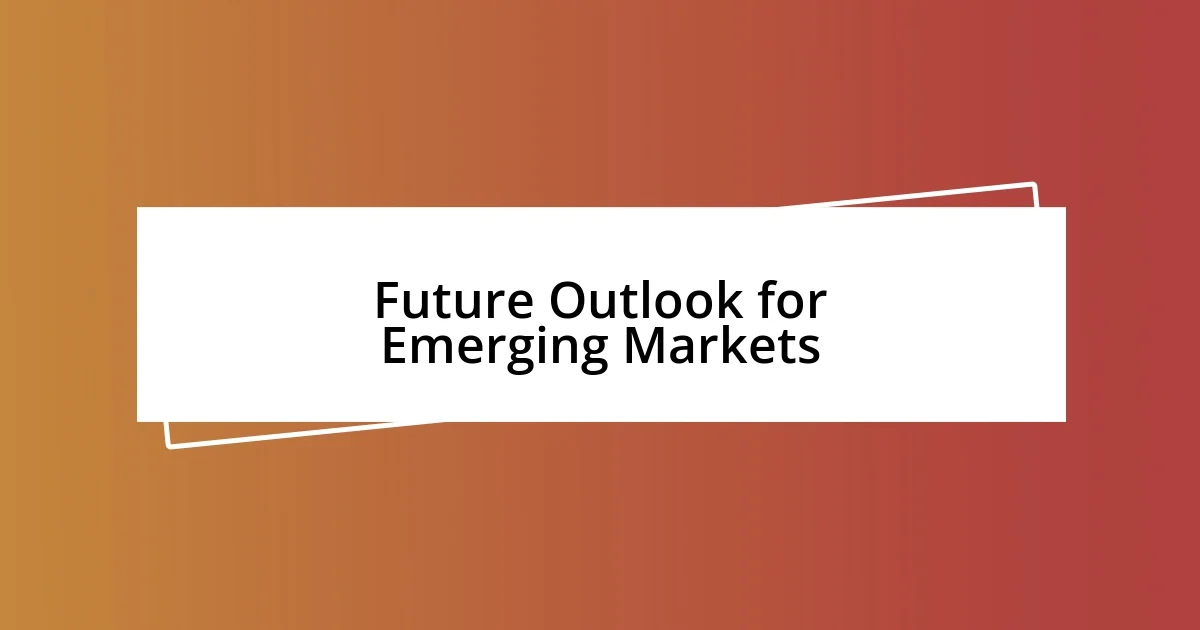
Future Outlook for Emerging Markets
The future outlook for emerging markets is both promising and complex. I recall sipping coffee at an international trade conference, where a seasoned economist painted a compelling picture of potential growth driven by technological adoption and a young workforce. But it also made me ponder: will the accelerating digital transformation be enough to outpace the existing infrastructure challenges that many countries face?
I believe there’s an uncharted territory waiting to be explored. At a recent workshop on sustainable development, I engaged with a surprising number of entrepreneurs passionate about environmental impacts. They weren’t just looking for profit; they aimed to innovate while also addressing climate change. This raises an intriguing thought: could emerging markets become the breeding ground for solutions that not only benefit local communities but resonate globally?
While some dismiss emerging markets as too risky, my experience suggests that those willing to understand local dynamics can find remarkable opportunities. A friend who invested early in the renewable energy sector in Southeast Asia shared how his venture not only thrived financially but also contributed to local employment. It led me to wonder: in our pursuit of progress, shouldn’t we prioritize investments that empower the very communities we engage with?







